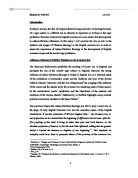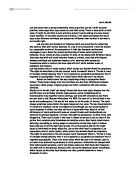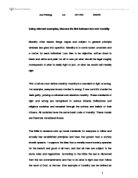A similar idea is conveyed when Sir Coke notes that the basic laws of England were not a product of design by the state but ‘written with the finger of God in the Human Heart’. This is a notion carried on by Dugdale who wrote in Origines Juridiciales; ‘the Common Laws of England are grounded upon the Law of God, and extend themselves to the original Law of Nature, and the universal Law of Nations and that they are not originally Leges scriptae’.
Moreover, in the Doctor and Student by Christopher St German, whose writings influenced English law for a period of two centuries; we are told that law is founded first on the eternal law, which is the wisdom of God.
By marrying the Holy Scripture to English law and proclaiming God to the Supreme author of English law, Fortescue and Coke were both able to make the nationalistic claim that English law is ‘not only Good the very Best’ and therefore beyond reproach in the eyes of rival jurisdictions.
Additionally, there are examples in Coke’s writing, which shows that Christian theology was not merely of theoretical significance in the development of the common law. As mentioned earlier, there was an attempt by jurists to include biblical texts as law. Coke invokes the Holy Ghost in a matter of substantive law; “…Against these Inventors and Propounders of evill things, the holy ghost hath spoken.” The result of this, according to Pollock and Maitland is that ‘Theology itself must become jurisprudence, albeit Jurisprudence of a supernatural sort, in order that it may rule the world’. It would seem therefore that Christian theology, despite the establishment of a secular legal order following the Henrician Reformation, became essentially part of English common law. In this way a Christian tradition in common law began emerging and stayed. Even in relatively modern cases, judges have applied principles within Christianity. A famous example is Donaghue V Stevenson where Lord Atkins developed the neighbour principle for the duty of care, which is largely derived from the Gospels- the Christian duty to love one’s neighbours. The example of Coke with regards to monopolists and the modern day example of the neighbour principle clearly illustrates the significance of Judaeo-Christian theology in the way it has shaped the English legal system from the early modern period and its survival into modern day.
Influence of Judaeo-Christian Theology on the Secular Legal Profession
According to Megarry’s assertions, the Inns of Court began taking shape as the physical centre of a secular legal profession in the early 1290s following the Ordinance of Edward I. The Ordinance prohibited members of the clergy acting as advocates in secular actions and subsequently, facilitated that ‘emergence of an unprecedented body of non-clerical lawyers’.
However, even after the Ordinance however many Christian theological influences continued to permeate the training and daily rituals and as well as the perceived role of lawyers.
As discussed earlier, given the strong influence of Judaeo-Christianity on the very fabric of the common law and the unwritten nature of the constitution, it is hardly surprising that the legal profession should also assert it’s position as interpreters of the ancient constitution.
Fortestcue’s bold proclamation in De Laudibus Legum Angliae; ‘we who are the Ministerial Officers, who sit and preside in the Courts of Justice, are therefore not improperly called: Sacredotes: The import of the Latin Word being one who gives or teaches Holy Things’. Having perceived the Common law as nothing less than the Word of God, Fortescue endows a religious element to the role of lawyers. It is also true that the legal profession sought to establish their position as interpreters of the ancient constitution, just as the church tried to establish itself as the ‘sole guardian of the word, in who resided he elusive right to interpret God’s will. Raffield has noted that since the common law was unwritten and based on ancient custom, it was for the common lawyers to expound upon the mysteries of that custom. From here followed the idea that the lawyers had the ‘exclusive right to interpret the ancient constitution’, just as clergy held exclusivity in interpreting scripture. Coke draws a line of demarcation and warns against any attempts by laymen or churchmen in interpreting the law and thus giving the secular legal profession authority over others; “it is a desperate and dangerous matter for Civilians and Canonists to write either of the Common Laws of England, which they profess not or against them which they know not.”
Having made a fundamental impact on the status and role of lawyers, Christian theology and its practices, as well as its symbolisms seeped into the Inns of Court and into the lives of lawyers.
In fact Blair noted the strong resemblance of the commons to the Rule of the Order of Saint Benedict and directly compares them and their practices: reading must not be wanting while the brethren eat at table…let this verse be said thrice in the Oratory: ‘Domine, labia mea aperies, et os meum annuntiabit laudem tuam. (O Lord, Thour Shalt open my lips, and my mouth shall declare thy Praise.)” Pollock and Maitland also highlighted the similarities between the laws governing Inns of Court and Christian religious organisations. Dugdale wrote in Origines Juridiciales that Christian service and worship was an essential part to life at the Inns; ‘they have every day three Masses said: one after the other: And the first Masse doth begin in the morning at seaven of the Clock, or thereabouts. The Festivall days they have Mattens and Masse solemnly sung; and during the Matyns singings they have three Masses said’. The public veneration of God was compulsory and like in the monasteries of the St Benedictine Order, absence could result in exclusion.
Moreover, the Christian tradition of Eucharist is an obvious manifestation of Judaeo-Christian theology that influenced the profession. It is an ‘exemplary sign of the Christian faith.’ Goodrich notes that the Eucharist is ‘ the sacrament, the appearance of grace and the continuing presence of Christ’.
Dugdale describes closely the feasts of All Saints rituals enacted in the Middle Temple and the Eucharist as performed by the Church;
‘there is delivered unto every Barrister a Towell with Wafers…and unto every Gentlemen under the Bar, a wooden Bowl, filled with Ipocras…after a solemn Congee made, the Gentlemen of the Bar first carry the Wafer; the rest, with the new Reader, standing in their places. At their return, they all make another Ipocras to the Judges…”
For the church the Eucharist is of obvious importance but in the lives of lawyers of the early modern period, the sacrament in the Inns of Court were both considered to be for the ‘building a community of the faithful and an order of privileged knowledge.’ Moreover, it is bears the theme of recognition and represents the continuing presence of deity while referring to the past.29b
Linked with the idea of sacrament, the rites of Communal Dining in the Inns of Court are perhaps one of the most iconic of the Christian theology that influenced the legal profession. The importance of the influence of Christian theology on the legal profession was clearly demonstrated ‘unequivocally through the act of communal dining at the Inns of Court’ One striking images is that of lawyers at the Gary’s Inn and Middle Temple eating Calves head to celebrate the Resurrection of Christ at Easter. The strong religious symbolism- the calves being the traditional animals for sacrifice in the Old Testament as well as a symbol for kingship and procreation.30a
It is also apparent that even the diet of the secular lawyers in the Inns of Court were affected by Judaeo-Christian religious symbols. The consumption of mutton in the Middle Temple was highly symbolic. It signifies the sacrifice of Christ as well as what the presence of Christ in law.
Moreover, although the legal profession certainly considered themselves an elite group that exclusively writes and interprets the issues of English law they do not appear to have led daily lives in great luxury in the Inns of Court. They are more similar to those of clergy. According to Fullbecke “ a student [of the common law] must in his diet be temperat, and abstinent…continency in dyet us the step to wisdom.” He goes on to say ‘[the] next thing I require in a Student is temperance…a restreint of the minde from all voluptuousness and lust, as namely from covetousness, excesse of diet, wantonness and all other unlawful delights”. These are clearly values that Judaeo-Christianity prescribes of those in presitly roles, or those residing in monasteries. These ideals seem to reinforce the idea that lawyers were to act to act in a ‘sacredotal’ fashion.
Finally, it is also evident is that Judaeo-Christian influences on the way in which business was conducted within the Inns and how lawyers received training. Dining reflected the notion that the Word of God was symbolically eaten at dinner. The spoken Word and readings were also viewed in a similar light. The Word was made flesh and the students of the law who had to perform moots and readings, Coke wrote specifically with regards to eating the law; ‘in reading these and other of my Reports, I desire the Reader that he would not read (and as it were swallow) too much at once; for greedy appetites are not for the best digestion; the whole is to be attained by parts’.
Conclusion
In conclusion, with regards to the jurists of the time, it is not to bold to say that Judaeo-Christian theology formed the basis of early English Common law. There were other influences at play during the early modern period, for example the classical tradition was a highly influential source of English constitutional authority and it played a significant role, sometimes in synthesis with Christian theology.
However, the notion that English law was the earthly manifestation of God’s law was the assertion made by many English jurists of the medieval and early modern period.
Moreover, even though the legal profession became a largely secular, the Inns of Court remained a place full of religious iconography in the form of dining rituals, the Eucharist, the oral tradition in the training of lawyers and what lawyers begin to consider as their right- the Sacredotal role of the legal profession to interpret the ancient constitution. Therefore, It would seem therefore that the importance of Christian theology in the development of English common law and the secular legal profession was an incalculable one.
Bibliography
Books
Coke, E., “The Second Part of the Institutes of the Laws of England”, London: Flesher, 1642
Coke, E., “The First Part of the Institutes of the Laws of England”, London: Flesher, 1644
Coke, E., “The Reports, 7 Volumes”, London Rivington, 1777
Dugdale, W., “Origines Juridiciales or Historical Memorials of the English Laws”, London: F. & T., Warren, 1666
Fortescue, J., “De Laudibus Legum Angliae: ed. J. Selden, London: R. Gosling, 1737
Fortescue, J., “The Governance of England”, ed. C Plummer, Oxford: Clarendon, 1885
Fulbecke, W., ‘A Direction or Preparative to the Study of Lawe Wherin is showed, what things ought to be observed and used of them that are addicted to the study of the law”, London: T. Wight, 1600
Goodrich, P., “Languages of law: from logics of memory to nomadic masks”, London: Weidenfield and Nicholson, 1990
Maitland, F., Pollock, F., “History of English Law”, Volume 2, Cambridge: Cambridge University Press, 1898
Prest, W., “The Rise of the Barristers: a social history of the English bar, 1590-1640”, Oxford: Clarendon Press, 1986
Raffield, P., “Images and Cultures of Law in Early Modern England, Justice and Political Power 1558-1660”, Cambridge: Cambridge University Press, 2004
Milsom, S. F.C., “Studies in the History of the Common Law”, London: Hambledon Press 1985
Journals
Ibbetson, D “Common Lawyer And the Law Before the Civil War”, (1988) 8(1) Oxford Journal of Legal Studies p142
Goodrich, P., “Signs Taken for Wonder: Community, Identity, and A History of Sumptuary Law”, (1998) 23(3) Law and Social Inquiry 707
Raffield, P., “Bodies of Law: The Divine Architect, Common Law and the Ancient Constitution”, (2000) 13 International Journal for the Semiotics of Law 333
Cases
Donoghue v. Stevenson (1957), 20 M.L.R.
Statues
Act of Supremacy (1534)
Misc. Publications
Zimmermmane, A., “The Christian Foundation of the Rule of Law in the West: a Legacy of Liberty and Resistance Against Tyranny”, accessed at
www. creationontheweb.com/content/view/4758 at 18/04/2008
Raffield, P., “Images and Cultures of Law in Early Modern England, Justice and Political Power 1558-1660”, Cambridge: Cambridge University Press, 2004 p. 1
Raffield, Op. Cit. note 1 p. 1
Dugdale, W., “Origines Juridiciales or Historical Memorials of the English Laws”, London: F. & T., Warren, 1666
5b Raffield, Op. Cit. note 1
Fulbecke, W., ‘A Direction or Preparative to the Study of Lawe Wherin is showed, what things ought to be observed and used of them that are addicted to the study of the law”, London: T. Wight, 1600,10a
Coke, E., “The Reports, 7 Volumes”, London Rivington, 1777 p137
Dugdale, W., “Origines Juridiciales or Historical Memorials of the English Laws”, London: F. & T., Warren, 1666, p. 3
St Germain, C., “The Doctor and Student”, (1518) accessed at on 18/04/2008
Fortescue, J., “De Laudibus Legum Angliae: ed. J. Selden, London: R. Gosling, 1737, p. 10
12.Raffield, P., “Bodies of Law: The Divine Architect, Common Law and the Ancient Constitution”, (2000) 13 International Journal for the Semiotics of Law p. 347
Coke, E., “The First Part of the Institutes of the Laws of England”, London: Flesher, 1644, Institutes p. 181
Maitland, F., Pollock, F., “History of English Law”, Volume 2, Cambridge: Cambridge University Press,1989, p. 5
Donoghue v. Stevenson (1957), 20 M.L.R.
Raffield, Op. Cit. note 1 p12
Fortescue, Op. Cit. note 11, p.4-5
Raffield, Op.Cit. note 12, p.335
Raffield, Op. Cit. note 1
Coke, Op. Cit. note 13, Preface
Raffield, Op. Cit. note 1
Pollock & Maitland, Op. Cit. note p.2
Dugdale, Op. Cit. 9 fo.205
Goodrich, P., “Languages of law: from logics of memory to nomadic masks”, London: Weidenfield and Nicholson, 1990, p. 54
Dugdale, Op. Cit. 9, fo. 205
Raffield, Op. Cit. note 1 p. 17
Fulbecke, W., ‘A Direction or Preparative to the Study of Lawe Wherin is showed, what things ought to be observed and used of them that are addicted to the study of the law”, London: T. Wight, 1600,12a
Coke, Reports, Part iv, preface, p. x.
Raffield, Op. Cit. note 12, p. 335







